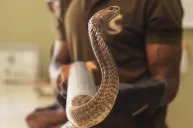A Kentucky zoo director experienced a nightmare scenario after a highly venomous snake. He's fortunate to have survived the incident.
Jim Harrison, co-director of the Kentucky Reptile Zoo, said that a Jameson's mamba snake bit him. The incident happened on April 28. In an interview with WKYT-TV, the zoo director said he was trying to breed the two snakes for an anti-venom initiative. That's when the reptile bit him suddenly.
"The male shot out. I grabbed it with wraps, and then the female took advantage of me not paying attention and then shot up and bit me," Harrison recalled to the outlet.
Known for its green shade, a Jameson's mamba is not a snake you want to mess with. Its bite is "highly venomous" and also neurotoxic as well. Once bitten, the venom can cause your nervous system to begin to fail. This can lead to both paralysis, trouble breathing, and even death. Basically, the zoo director was in dire straits.
Kentucky Reptile Zoo co-director Kristen Wiley said that Harrison began to deteriorate quickly and was "in pretty serious shape rather quickly." Fortunately, the zoo had some antivenom on hand that could help. Harrison had one of the zoo keepers to drive him 10 miles away to a facility where they kept the anti-serum vials.
"And they started the anti-serum, five vials there, they put me in the helicopter and intubated me, and after that, I don't know anything," Harrison recalled to WKYT-TV.
Snake Bite
Wiley said the zoo director still almost died despite the anti-venom.
"Those guys here that responded right away, they definitely saved his life," Wiley told the outlet. "[Harrison] was in the ICU for about three days. He was intubated for about two days, which means he was on a ventilator for that time."
"It's not instant pain. The pain is some of the muscle breaking down, I believe," Harrison told WKYT-TV. "There's not a lot known about this particular species and, as far as I know, nobody in the United States has been bitten by one."
"Obviously, that would be a huge advantage if they could mitigate pain without having the same addictive tendencies as opioids do," Harrison said.




